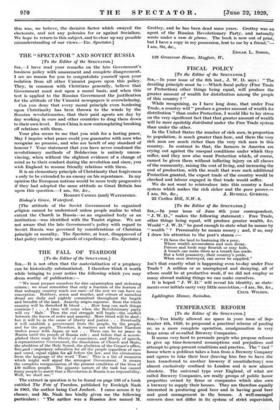THE FALL OF TSARDOM
[To the Editor of the SPECTATOR.] Sm,—It is not often that the materialization of a prophecy can be historically substantiated. I therefore think it worth while bringing to your notice the following which you may deem worthy of publication :— • •
" We must prepare ourselves for dire catastrophes and sickening crimes ; we must remember that only a fraction of the horrors of that unhappy country reach our ears—of the rest we can have no conception. Robbery, arson and murder, and crimes of nameless dread are daily and nightly committed throughout the length and breadth of the land. Anarchy reigns supreme. Soon the whole country will be drenched In blood . . . How long can such things continue ? . . . A time will come when the Revolutionary party will cry Halt.' Then the real struggle will begin—the conflict between the forces of order and anarchy. More blood will be shed ; but it will be in the cause of liberty and justice . . . Eventually it will establish a government from the people, by the people, and for the people. Therefore, it matters not whether Tsardom makes peace with Japan or not . . . There can be no peace in Russia until the people of Russia rule ; and before that is accom- plished there must be liberty of conscience, and liberty of speech. a representative Government, the dissolution of Church and State, the abolition of the Holy Synod, the abolition of the Censor's office, free,and compulsory education for all the people regardless of race and creed, equal rights for all before the law, and the elimination from the language of the word ' Tsar.' This is a list of measures which might well appal the strongest Government. It means the complete reorganization of the present condition of the lives of 150 million people. The gigantic nature of the task has caused many people to assert that a Revolution in Russia is an impossibility. Well, we shall see."
The extract in question is to be found on page 186 of a book entitled The Fate of Tsardom, published by Eveleigh Nash in 1905, the author being Carl Joubert. I came across it by chance, and Mr. Nash has kindly given me the following particulars : " The author was a Russian Jew named M. Grottey, and he has been dead some years. Grottey was an agent of the Russian Revolutionary Party, and naturally wrote under a nom de plume. The book is now out of print, but I have a copy in my possession, lent to me by a friend."— I am, Sir, &c., 128 Grosvenor House, Mayfair, W. EDGAR L. SIMON.












































 Previous page
Previous page